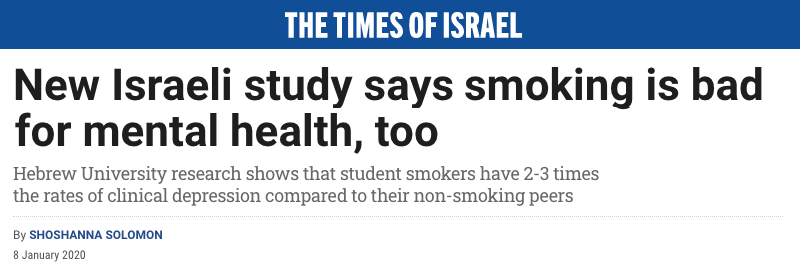

A new study shows that smoking not only causes physical damage, but is also detrimental to mental health.
For decades, doctors have warned about the health hazards of smoking. However, their warnings focused on the physical risks that cigarettes pose to health, including lung cancer, heart disease, low birth weight and high blood pressure.
Prof. Hagai Levine at Hebrew University of Jerusalem’s-Hadasssah Braun School of Public Health and Community Medicine, together with assistant professor Tatjana Gazibara at the University of Belgrade and PhD student Marija Milic at the University of Pristina, published findings on the mental health risks related to smoking.
The study was published Wednesday in the journal PLOS ONE.
The researchers surveyed more than 2,000 students enrolled at Serbian universities with differing sociopolitical and economic environments. Their findings showed that students who smoked had higher rates of clinical depression than their non-smoking peers.

The data showed that student smokers had rates of clinical depression that were two to three times higher than those of their non-smoking peers. Specifically, at the University of Pristina, 14 percent of smokers suffered from depression as opposed to 4% of their non-smoking peers, and at Belgrade University the numbers were 19% to 11%, respectively.
In addition, no matter their economic or sociopolitical backgrounds, students who smoked had higher rates of depressive symptoms and lower mental health scores, such as vitality and social functioning, than non-smoking students.
“Our study adds to the growing body of evidence that smoking and depression are closely linked,” said Hebrew University’s Levine in a statement. “While it may be too early to say that smoking causes depression, tobacco does appear to have an adverse effect on our mental health.”
In light of the new study, Levine called on policymakers to take smoking’s mental health effects into account when setting out anti-smoking policies.
Universities should “advocate for their students’ health by creating ‘Smoke-Free Campuses’ that not only ban smoking on campus but tobacco advertising, too,” he said.
Combined with policies that prevent, screen for and treat mental health problems, including addiction, these steps would go a long way toward combating the harmful effects that smoking has on our physical and mental states, he said in the statement published by the university.
In a disclosure, the university said that Levine received lecture fees from drug maker Pfizer, which distributes a smoking cessation pharmacotherapy method in Israel.